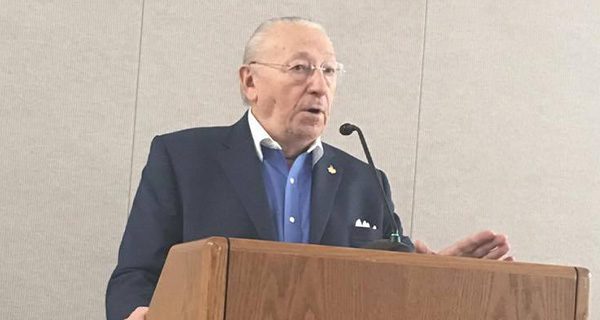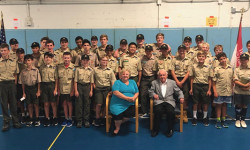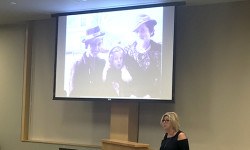[ccfic caption-text format="plaintext"]
By Katrina Margolis
Hometown Weekly Reporter
As Israel “Izzy” Arbeiter says himself, it is impossible to capture five and a half years of one’s life in an hour or an article. Countless articles have been written about Holocaust survivor Arbeiter, and to recount his life is a daunting and, truly, impossible task. The 91-year-old Newton resident spoke at Temple Beth David Sunday morning as the guest speaker for their annual brunch.
The first thing you notice about Arbeiter is how charismatic and funny he is. A member of the congregation asked if he would like a cup of coffee. After nodding his head yes, the member said, “How would you like it?” Without missing a beat, Izzy responded, “In a cup.”
Marcia Colagiovanni, a Dedham resident and another member, as well as someone who has seen Arbeiter speak before, said: “You missed your true calling in life, Izzy. You should have been a stand-up comedian!”
One of the most forgotten things when hearing Holocaust survivors speak is that they, too, are just people. After Izzy’s joke, the table erupted into laughter, mostly because the joke was quite funny, but also a little bit out of surprise. There is an expectation that those who have witnessed something so horrible can’t possibly have the joy or happiness that those who haven’t do. Izzy proved that assumption incredibly wrong.
Born in Poland in 1925, Arbeiter was in a ghetto or concentration camp of some sort from the age of 14 to the age of 20. He said that he was born twice, as he was liberated miraculously on his twentieth birthday. Izzy and two of his brothers survived, while his parents and younger brother, only seven at the time, were taken to Treblinka and murdered. As someone reached down to thank him for telling his story, he responded, “It has to be told.” Despite the difficulty of remembering and re-telling what happened again and again, it is a duty he takes on to honor his parents.
One of the most poignant moments of Arbeiter’s story, as well as the moment which seemed to have driven Izzy’s work all these years, is the day he was separated from his parents. “We were separated into two groups, those who could work and the elderly and young, who were useless,” he said. “I tried to sneak over to the other group where my parents were, and succeeded. My dad said to me, ‘Go back and save yourself. If you survive, make sure to carry on the Jewish tradition.’” And that he has.
Arbeiter travels all over the state of Massachusetts, as well as all over the world. He returns to Germany frequently, and has even been honored by the German government for being a symbol of good relations between the Germans and the Jews. Izzy spoke about the first time he returned to Auschwitz, after the camp had been shut down, and the War long ended. “I walked in through the gate and I walked maybe ten, fifteen steps or so. All of a sudden, I stop.
Something made me think of stopping and I turn around and look to make sure the gate is still open. I remember when people came or went out the gate closed, so I was wondering, I am in Auschwitz, will I be able to go out from here?”
Arbeiter has endured more than most can even fathom. He said that when people don’t believe what he says is true, he doesn’t blame them. “It is impossible for the human brain to imagine something so horrible that a government would build and a government would carry out and do to other people,” he said.
Elyse Rast, Manager of Outreach and Education for Schechter Holocaust Services, and a friend of Izzy and his wine Anna for 10 years, introduced him in the perfect way. “Every time you hear a Holocaust survivor, you are bearing witness to the incredible, horrible even that took place. So after you hear this, you have a choice. You could say, ‘Oh, that was interesting’ and never think about it again. You could leave here really sad and think the world is a horrible place and there is no hope. Or, you can listen to these words, see the incredible things that Izzy has done with his life, and see the joy that Izzy has when he speaks about his wife and his children, and you can say, ‘You know what? There is hope, and I am that hope.’”
Izzy has not let what happened to him inhibit his capacity for joy and for life. His wife, Anna, and he have been married for 70 years, and have three children, three grandchildren and four great-grandchildren. He is an inspiration and a beacon of hope in a world that can often seem dim or hopeless.























